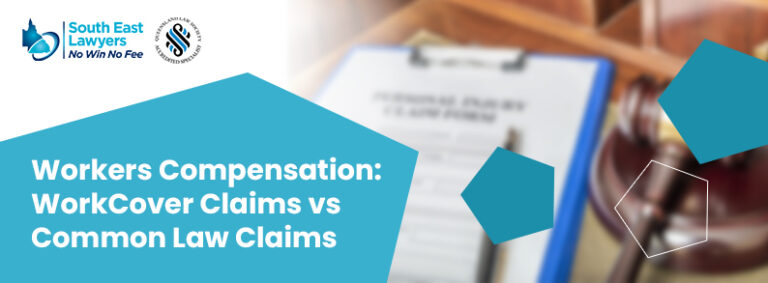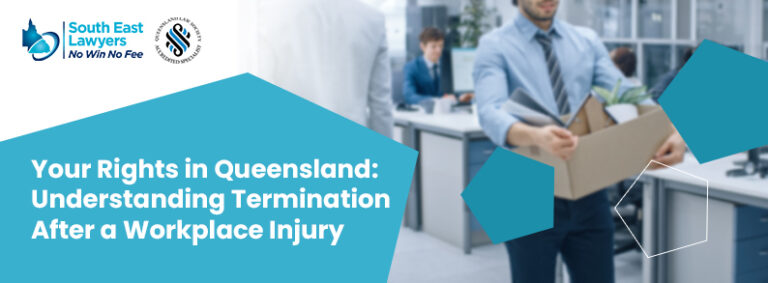Have you ever been injured at work and wondered how to navigate the complicated maze that is the workers’ compensation system? You’re not alone.
Every year, countless workers in Queensland find themselves in this exact situation. But there’s good news: understanding and managing a WorkCover claim doesn’t have to be a daunting journey. Armed with the right information on how to lodge a WorkCover claim in Queensland, it’s a path that can be navigated with relative ease. Let’s unravel this complex process together, step by step.
Key Takeaways
- WorkCover Queensland provides coverage for employees injured at work, including various medical expenses and wage losses. Initiating a claim involves promptly seeking medical attention, notifying the employer in writing, and lodging a claim with WorkCover QLD.
- All employees in Queensland are covered by WorkCover for work-related accidents, including travel and work-related activities. However, volunteers may not be eligible.
- After a claim is lodged, WorkCover assesses it based on medical reports, wage verification, and other evidence. If approved, claimants receive weekly compensation payments calculated based on wages before the injury.
- Effective claim management includes verifying the accuracy of compensation payments and cooperating with WorkCover throughout the recovery process. A safe and gradual return to work is encouraged, with WorkCover supporting necessary medical treatments and workplace adjustments.
- If a claim is denied, understanding the reasons for denial, and seeking legal advice from experienced workers’ compensation lawyers, like South East Injury Lawyers, can be crucial.
Understanding WorkCover Queensland
WorkCover Queensland provides support and hope for employees who have suffered work-related injuries or illnesses. As a workers’ compensation insurance provider, it serves Queensland employees who have experienced a work-related incident by providing them with benefits. Every employer is mandated to possess WorkCover insurance, making it a ubiquitous part of the employment landscape.
When an injury at work occurs, it’s not just a race against time for recovery, but also to report the injury to WorkCover Queensland. As the workers compensation regulator, WorkCover allows notifications through various accessible means – online, via phone, or through the mail. But remember, the key aspect here is promptness. The sooner you notify, the sooner you can claim.
Who is Covered by WorkCover?
So, who exactly is covered by WorkCover Queensland? The answer is simple: all employees. WorkCover’s coverage is broad, offering protection for work-related accidents, including those happening during travel to or from work and while carrying out work-related activities. This coverage applies to both self-insured and non-self-insured employers, ensuring a broad safety net for all Queensland employees.
However, there is a catch. Volunteers, despite their invaluable contributions, unfortunately may not qualify for coverage under WorkCover Queensland. You can find out from WorkCover if the organisation you volunteer for is eligible.
So, if you’re a worker in Queensland, WorkCover has got you covered. But remember, it is always advisable to clarify your eligibility status with your employer or WorkCover Queensland directly.
What is Covered by WorkCover?
WorkCover’s protection extends beyond injuries to also cover the ensuing financial burdens, including medical expenses. Once a claim is approved, WorkCover intervenes to offer weekly payments and meet various medical costs. Lost wages, physiotherapy, rehabilitation, surgery, and any other necessary assessments or treatments are covered, ensuring that the road to recovery isn’t marred by financial hurdles.
However, while WorkCover’s coverage is comprehensive, it does have its limits. Certain services such as:
- massage therapists
- natural therapists
- pilates instructors
- personal trainers
- naturopaths
- homeopaths
- acupuncturists
are not usually covered. Therefore, it’s important to be aware of what treatments are covered and plan your recovery accordingly.
Initiating a WorkCover Claim
Following a work injury, it’s important to start your WorkCover claim promptly. Seeking immediate medical attention is the first step. Taking this action can be essential to your health and wellbeing. also, isn’t just a crucial step for your health but also for your claim, as a medical certificate or report from your treating doctor is a necessary component of the claim form.
Once your health is taken care of, the next step for an injured worker is to notify your employer about the injury. This should be done in writing and include details of how and when the injury occurred.
Finally, lodge a WorkCover claim with WorkCover Queensland either online, by phone, or by mail. The claim should provide detailed information about your injury, employment, and medical status. Although this process may appear complicated, it’s a required route to securing your rightful compensation.
Seek Medical Attention
When a work-related injury occurs, your first priority should be your health. Seeking immediate medical attention is not only crucial for your recovery but also for your WorkCover claim. A timely visit to the doctor helps prevent your injury from worsening and ensures prompt treatment. More importantly, it allows for accurate documentation of your injury, which is key for your workers’ compensation claim.
A Work Capacity Certificate from your doctor is necessary to back up your claim. This certificate should confirm that the injury is work related. It’s essential to consult with a medical professional before notifying your employer about the injury. Remember, WorkCover can reimburse you for initial emergency medical treatment costs, so don’t hesitate to seek immediate medical attention if required.
Notify Your Employer
The sooner you notify your employer, the better. Delay can lead to complications in your claim process. If your employer fails to acknowledge your injury, you have the right to notify the Workplace Health and Safety Queensland (WHSQ) immediately. Your employer is legally obliged to support you through this process and ensure that your rights to access workers’ compensation are upheld.
Complete the Claim Form
Once your employer is notified, the next step is to lodge your WorkCover claim. You have multiple options to do this. You can either do it online, by phone or by mail. The claim form requires detailed information about your injury, your employment, and your employer. You must submit a medical certificate or report from your doctor as evidence. This must include details of treatment, diagnosis and test results from any tests performed.
Submitting a WorkCover claim can be a daunting task, but it doesn’t have to be. By providing accurate and detailed information, you can ensure your claim is processed smoothly. Remember, the more information you provide, the easier it will be for WorkCover to assess your claim.
One way to ensure that your claim meets all of the requirements and improve your chances of success is by engaging the services of a workers compensation lawyer. We can provide legal advice, ensure that you are including the correct information in your claim and that you won’t become a victim of common workers compensation pitfalls.
Navigating the Claims Process
After lodging your claim, the subsequent step involves working through the claims process. This involves:
- Understanding how WorkCover assesses your claim
- Understanding how compensation payments are calculated and disbursed
- Cooperating with WorkCover and providing any necessary information or documentation during this process.
WorkCover adheres to specific guidelines and procedures when assessing claims. This process includes examining the details of your case and reaching a decision grounded on the evidence given. This may seem like a daunting process, but understanding how it works can make it much more manageable.
WorkCover’s Assessment and Decision
WorkCover’s assessment process begins once your claim is lodged. They review your claim based on established guidelines and procedures. This involves:
- Examining your medical reports
- Reviewing your work capacity certificate
- Reviewing any other evidence you’ve provided
- Verifying your wages and the circumstances of your work-related incident with your employer.
Following this thorough assessment, WorkCover makes their decision. This careful and critical process helps guarantee fair and accurate evaluation of all claims. Remember, WorkCover’s decision is made based on the evidence presented, so it’s crucial to provide as much accurate and relevant information as possible.
Receiving Weekly Compensation
If your claim is approved, you will likely be entitled to weekly compensation payments. These payments are calculated based on the wages you received from your current employer in the 12 months prior to the injury. This is where your employer’s verification of your wages comes into play, as well as the importance of workers’ compensation claims.
These weekly compensation payments are taxable and are designed to replace the income you’ve lost due to your injury. If you have any questions or concerns about your compensation payments, our workers’ compensation lawyers can review your case. There may be certain circumstances that impact the payment amounts you may be eligible for.
Managing Your WorkCover Claim
Managing your WorkCover claim effectively is key to ensuring a smooth claims process. This entails knowing how to safely resume work and verifying the accuracy of your compensation payments. It’s important to remain proactive and involved throughout the claims process. This will not only aid in your recovery but also ensure you receive the compensation you’re entitled to.
Remember, even if your claim is approved, your journey isn’t over. You’re entitled to support from your employer and WorkCover throughout your recovery. This includes access to rehabilitation and return to work services. Active management of your claim can help ensure a smoother, less stressful recovery.
Returning to Work
Returning to work after a work-related injury is an integral part of the recovery process. It’s about more than just resuming your normal routine; it’s about restoring your sense of normalcy and working towards a full recovery. However, it’s vital to guarantee a safe return to work at a pace compatible with your recovery.
WorkCover Queensland is committed to supporting you through this process. They provide resources and support to help you return to work safely. This includes helping you access medical treatment and rehabilitation services, as well as making any necessary workplace adjustments. Remember, returning to work is a collaborative process, and both you and your employer have a role to play in ensuring it’s a successful one.
Ensuring Accurate Payments
Verifying the accuracy of your WorkCover payments is as important as managing your claim. WorkCover will provide you with a payment schedule that outlines the amount and frequency of your payments. It’s your responsibility to ensure that these payments are accurate and reflect the compensation you’re entitled to.
If there are any changes to your payment schedule or if you notice any discrepancies in your payments, it’s important to communicate this to WorkCover as soon as possible. Also, remember to keep records of all your payments and any changes to your payment schedule. This can be a valuable resource if any issues arise with your payments in the future.
Handling Claim Denials or Rejections
Unfortunately, not all WorkCover claims are approved. If your claim is denied or rejected, it’s important to understand why this has happened and what steps you can take next. This is where understanding the common reasons for claim denials and seeking legal advice can be invaluable.
A claim denial might seem like a major hindrance, but it’s not the final hurdle. In fact, it can be an opportunity for a more thorough investigation of your claim and improved chances of success. So, if your claim is denied, don’t lose hope. There are still steps you can take to pursue your workers’ compensation.
Reasons for Denial
There are several common reasons why a WorkCover claim might be denied. These can include:
- The claim wasn’t submitted within the prescribed timeframe
- The injury didn’t occur at work or during work-related activities
- There wasn’t enough evidence to support the claim
Understanding these common denial reasons can assist in identifying any possible problems with your claim. If your claim has been denied, it’s important to review the reasons given and consider whether additional evidence or information could help strengthen your claim. Remember, a denial isn’t necessarily the end – it’s an opportunity to review and strengthen your claim.
Seeking Legal Advice
If your claim is denied, it may be beneficial to seek legal advice. At South East Injury Lawyers, we are experienced injury and compensation lawyers who can assist with denied or rejected claims. We can provide legal advice and representation to ensure your rights are upheld and that you receive the compensation you’re entitled to.
Legal advice could be of particular value if your claim involves complex matters or if you’re uncertain about the next steps. Even if you’re confident in your ability to manage your claim, a legal professional can provide valuable insight and guidance. Remember, you don’t have to navigate this process alone. Support is available, and it’s okay to ask for help.
If you’re not ready to get in touch with us just yet, you can check out these related links, including further information regarding workers comp claim denials and the role of a personal injury lawyer in workers’ compensation matters.
Common Injuries and Common Law Claims
WorkCover encompasses a variety of injuries, from physical injuries to psychological distress. Knowing what injuries are covered can assist in determining your eligibility to make a claim. Additionally, in some cases, you may be able to pursue common law damages, which can provide additional compensation.
Whether you’re dealing with a physical injury or psychological trauma, it’s important to understand your rights and options under WorkCover. This includes knowing what types of injuries are covered and how to pursue common law damages.
Types of Injuries Covered
WorkCover covers a wide range of physical and psychological injury or illness caused by work-related accidents or events. This includes injuries like cuts and lacerations, burns, fractures, and psychological conditions like depression, anxiety, adjustment disorder, and post-traumatic stress disorder.
While WorkCover’s coverage is wide-ranging, it’s important to note that not all injuries are covered. For instance, injuries that are not directly related to your employment or that occur outside of work may not be covered. It’s always advisable to check with WorkCover Queensland or a legal professional if you’re unsure whether your injury is covered.
Pursuing Common Law Damages
In some cases, you may be able to pursue a common law claim in the form of common law damages in addition to your WorkCover claim. Common law damages are a type of compensation that you can claim if you can prove that your employer was negligent, and that this negligence caused your injury. Pursuing common law damages can result in a lump sum compensation payment, which can provide additional financial support during your recovery.
To pursue common law damages, you must first have an accepted statutory claim. From there, you’ll need to navigate the process of statutory claims, which involves:
- Collecting evidence
- Notifying WorkCover
- Proving a breach of duty
- Either negotiating a settlement or proceeding to court
It’s a complex process, but with the right support and advice, it’s a path that can lead to a successful outcome. In this situation, we highly recommend engaging the services of a personal injury and workers compensation lawyer.
Manage Your Workers’ Compensation Claim with South East Injury Lawyers
Navigating and managing a WorkCover claim doesn’t have to be a daunting process. With the right knowledge and support, you can successfully navigate the claims process, manage your recovery, and ensure you receive the compensation you’re entitled to. Remember, whether you’re dealing with a physical injury or psychological trauma, support is available and it’s okay to ask for help.
If you’re looking for a workers’ compensation lawyer in or around the Brisbane area of Queensland, get in touch with us here at South East Injury Lawyers. Our legal services are available on a no win no fee basis and we pride ourselves on ensuring our clients receive the compensation and entitlements they deserve.
Call us on 1300 446 999 or book a case review online here.






